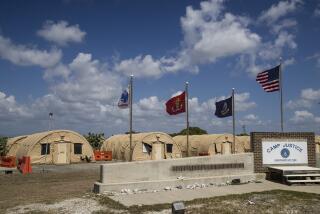Defector Says Soviets Questioned POWs : Missing: The former Vietnam army colonel also says Hanoi is not holding any live American MIAs.
WASHINGTON — A former North Vietnamese army colonel told U.S. lawmakers Thursday that some American prisoners were interrogated by the Soviets during the Vietnam War, but he said he does not know whether any were sent to the Soviet Union for detention.
The testimony of Bui Tin, who defected to France last year, addresses a longstanding theory by some activists on the issue of U.S. POWs and those missing in action that some of the Americans who disappeared during the war may have been sent to the Soviet Union.
“I do know that some Cubans and Russians interrogated some American prisoners and treated them badly,” Tin told members of the Senate Select Committee on POW-MIA Affairs. “But I do not know any information about Russia and Cuba keeping Americans.”
Tin said the Soviets and the Cubans interrogated American POWs with expertise in electronics around December, 1972.
He also confirmed the Vietnamese government’s statement that no living U.S. prisoners are being held in Vietnam. “Not only under oath, but more importantly, on my honor as an officer, I categorically state that there is not any MIA or POW alive in Vietnam today,” he said. “As for Laos and Cambodia, I do not know the situation as well as in Vietnam. But I trust that the Laotian and Cambodian governments are not interested in keeping any Americans.”
Tin, a former Vietnamese Communist Party member and former editor of two Communist newspapers, told the committee he is now working for democracy in Vietnam. He was once the highest-ranking Communist officer in Saigon, where he accepted the final surrender of the South Vietnamese government in 1975.
Tin said the Vietnamese government does not have the remains of American POWs but that some Vietnamese citizens might be holding remains of missing Americans. “Many in Vietnam still believe that once they find remains or give information about live Americans, they will get a visa to go to the (United States) or receive a $1-million reward,” he said.
Tin said Hanoi should help resolve the issue by giving U.S. officials and the families of missing servicemen access to its detailed records. He also said that normalization of relations between the two countries would promote democracy and reform in Vietnam.
Sen. John McCain (R-Ariz.) said he was impressed with Tin’s account. “Frankly, it gives me some hope and optimism that freedom will come to that country,” he said.
McCain and Tin had a previous encounter during the war, when Tin was interviewing POWs for a book he was writing. McCain was shot down in 1967 and was a prisoner of war in Vietnam for more than five years.
Tin’s testimony came as the committee completed three days of hearings on the fate of more than 2,000 U.S. servicemen missing since the Vietnam War. Some veterans and families of MIAs and POWs told the panel they suspect a government cover-up.
While Pentagon witnesses said they have no evidence that U.S. servicemen are still being held captive, most government officials and activists agree it is appropriate to assume that missing personnel are still being held captive unless it can be proven otherwise.
Tracy Usry, chief investigator for Republican members of the Senate Foreign Relations Committee, said a report by the committee concluded that the Pentagon had disregarded evidence of surviving U.S. servicemen.
The report, published in May, also noted that investigations of some reports of live sightings were closed prematurely and that the conclusions of some reports did not accurately reflect the raw data they were based on, Usry said.
Several senators challenged Usry’s testimony after he was unable to cite evidence for his claims.
More to Read
Sign up for Essential California
The most important California stories and recommendations in your inbox every morning.
You may occasionally receive promotional content from the Los Angeles Times.










